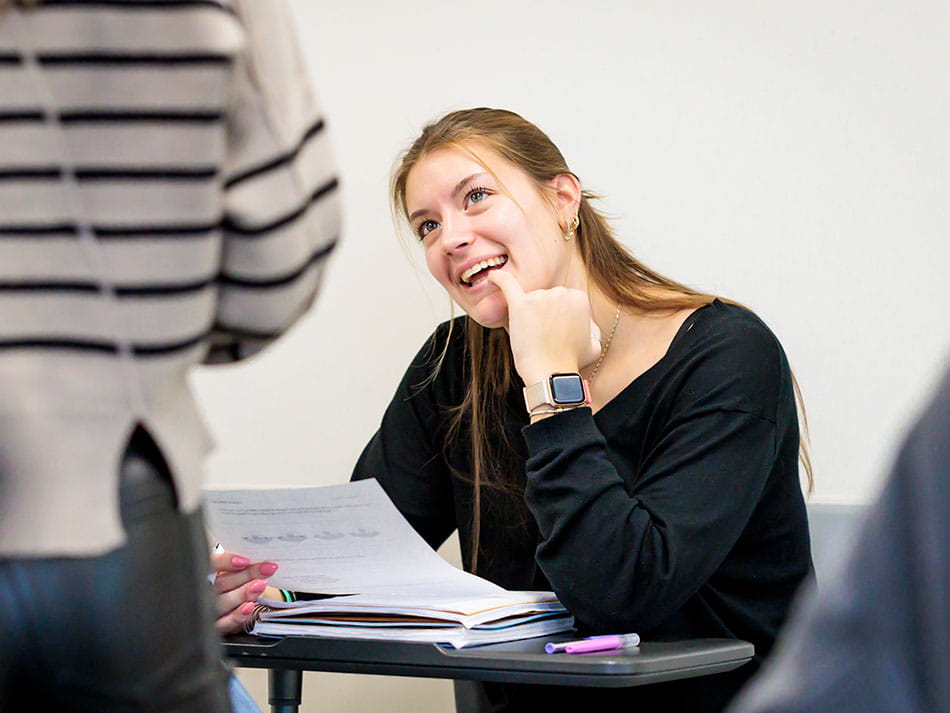An email that took less than five minutes to send unexpectedly changed Ashley Appleby’s life.
Although she’s now Endicott’s newest Assistant Professor of the Criminal Justice Program, Appleby was once a Quinnipiac University freshman unsure if college was even for her.
“I wasn’t going to stay in college. I had below a 3.0 GPA in my first semester,” Appleby, now a proud first-generation graduate, admitted.
The only class that spoke to her during that rough first year was Introduction to Criminal Justice, a course taught by Steve McGuinn, who now directs Quinnipiac University’s criminal justice program. Appleby excelled in McGuinn's classroom, and he personally emailed her to encourage her to declare a criminal justice major.
“He was the first professor in college to acknowledge how hard I was working and provide positive feedback about my performance,” Appleby said. “I bet he doesn’t even remember writing to me, but it kept me from dropping out of college and led me to pursue criminal justice.”
A few years later, Appleby was admitted to participate in an experiential learning opportunity—a course taught by McGuinn inside the local maximum-security correctional facility. Half of her peers traveled to the facility from Quinnipiac each week, while half were currently incarcerated.
It was a transformative time.
“Although outside of the classroom, the incarcerated students were referred to as something or someone else, for those three hours each week, they were my classmates,” she said. “They truly motivated and challenged me to think about the world and the criminal justice system in ways that traditional on-campus students had not.”
The experience was part of the Inside-Out Prison Exchange Program, facilitating dialogue between traditional on-campus and incarcerated college students.
By the end of the semester, Appleby had found her north star.
After graduating from Quinnipiac, she completed a Ph.D. at Rutgers University-Newark’s School of Criminal Justice, where her dissertation was a multi-year research project on higher education in prison.
These days, life has come full circle.
At Endicott, Appleby teaches CJ 100: Introduction to Criminal Justice, CJ 215: Corrections, and CJ 302: Research Methods. Her courses build on her research focus—the intersection of higher education and the criminal justice system—and her recently published papers and forthcoming book, Higher Education in Prison: An International Comparison of the United Kingdom and the United States, examine how instructors provide high-quality higher education in the correctional environment.
She explained that this was achieved “through a mixed-method project including a survey and a set of in-depth interviews of instructors who teach in prisons across the United States, along with a historical analysis of punishment and corrections in both countries.”
This work builds on Appleby’s own experiences with the New Jersey Step Program, which offers associate and bachelor’s degrees to individuals in eight state prisons, and her work mentoring formerly incarcerated individuals to help them work through their personal statements, resumes, and applications in their pursuit of advanced degrees.
Appleby draws on her research and experiences to deepen how Endicott’s criminal justice majors understand and engage with these vital issues at the intersection of higher education and the criminal justice system.

For Corrections, her favorite class to teach, students listen to “Ear Hustle,” a Pulitzer Prize-nominated podcast about the day-to-day realities of prison. The podcast is recorded inside California’s San Quentin State Prison.
She has also designed a new course for 2025, Mass Incarceration and Collateral Consequences, which delves into the Massachusetts correctional system. The course features Bruce Western’s Homeward, which discusses the year-long journey of the reintegration of formerly incarcerated men throughout Greater Boston.
More than 2.2 million Americans are currently incarcerated across the country. Yet, for those whose lives have not personally been impacted by mass incarceration, it’s easy to think of them as nothing more than an abstract number and to reduce them to the mistakes they allegedly made.
Appleby wants her students to see those in the system as individual humans, which requires hearing first-hand stories.
“I think it does everyone a disservice to teach about criminal justice without including the voices of those in the system and those who have experienced it,” she said.
Although admittedly a “tough grader,” Appleby always remembers to take five minutes out of an already jam-packed day to send students encouraging emails like the one she received from McGuinn.
“I reach out to check in each semester,” Appleby said. “I want them to know that I’m always in their corner if they need help figuring out their next steps, and I’d like to think that most, if not all of them, know this and are comfortable turning to me as a source of support during their undergraduate career and beyond.”


